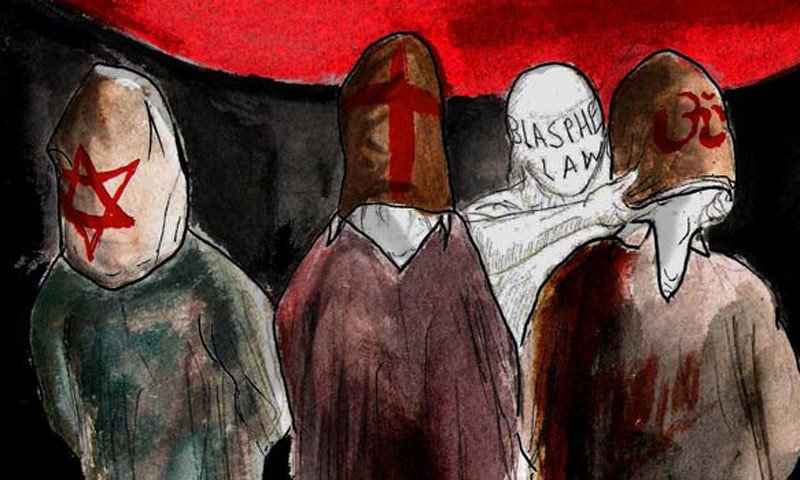Blasphemy politics and laws in Pakistan have long been a contentious and highly sensitive issue and allegations of blasphemy have had serious repercussions, including violence and casualties. The book “Sharia and State in Pakistan: Blasphemy Politics,” by Farhat Haq, illuminates the political and historical ramifications of Pakistan’s blasphemy laws. Political maneuvering, legal systems, and religious feelings are all deeply interconnected with the problem of blasphemy. This opinion article explores the effects of Pakistan’s blasphemy laws on religious minorities and most particularly their right to free speech.
Blasphemy is the act of insulting, demonstrating disrespect for, or lack of respect for God or anything regarded as sacred, and the only punishment for this according to the national assembly, is death. Blasphemy was made illegal on the Indian subcontinent by British legislation. When Pakistan gained independence in 1947, these regulations remained a part of the legislation. General Zia ul Haq ‘Islamized’ the blasphemy laws in 1987 as a part of a generalized Islamization campaign. Sections 295 A, B, and C of the Pakistan Penal Code presently include the blasphemy provisions, which are aimed at defending Islam. Despite a 2014 Supreme Court decision stating that all religions are protected by blasphemy laws, law enforcement officials and the public view these provisions as primarily protecting Islam.
According to the regulations described in Haq’s book, they were designed to increase political power and appease orthodox religious organizations. These rules have, however, been abused to stifle free speech, oppress religious minorities, and settle personal grudges.
Pakistan was created on religious grounds, but questions arose on the treatment of non-Muslim minorities, as was the case with the Ahmadis. Violence against religious minorities in Pakistan has seen a considerable rise in recent years. There are several causes for attacks on minorities in Pakistan, including the abuse of the blasphemy legislation, support for hate speech, biased education, and an unfriendly constitution. The use of blasphemy laws by the strong to exploit the helpless has helped to institutionalize and justify religious prejudice. The implementation of blasphemy laws worsens the nation’s plurality and contributes to the climate of insecurity and religious intolerance.
The freedom of religion was granted by Quaid-I-Azam’s liberal, idealistic constitutional ideals, but it was not simple in practice. Blasphemy laws and how minorities are treated go against the freedoms granted by Pakistan’s constitution, especially the freedom to practice one’s religion (Article 20), citizen equality (Article 25), and minorities’ protection (Article 36). Due to erroneous allegations, many innocent people have had to endure imprisonment, assault, or even murder. Many religious minorities have been pushed into hiding or quit the nation out of fear of being branded as blasphemers, leaving behind broken lives and devastated communities in their wake. Since the nation became more Islamized in the 1980s under former military dictator Zia-ul-Haq, there has been a rise in violence against Shias. He issued a law in 1984 banning Ahmadiyya persons from engaging in “anti-Islamic activities” and forbidding them from identifying as Muslims or promoting their views.
In Pakistan, blasphemy laws have had an awful impact on free speech, hindering creative thinking, open discussion, and critical thinking. People are reluctant to share their thoughts because of how ambiguous and wide these rules are, especially when it comes to talking about religion. Journalists, authors, and artists self-censor their work to be compliant with blasphemy laws, which causes societal intellectual and cultural stagnation. As it is evident in case of the Professor Junaid Hafeez, who was charged with blasphemy because he questioned orthodox wisdom and encouraged students to think critically and Asia Bibi, the first Christian woman to receive such a penalty, was sentenced to death by hanging in 2010 for blasphemy. Her offense was providing Muslim guys working in fields with water. Because the water was offered by a Christian, they rejected it. She was charged with blasphemy when she objected to this practice and maintained the integrity of her religion. She seems to have criticized Islam while supporting Christianity.
Political parties play a significant role in blasphemy politics in Pakistan, as they actively participate in forming and influencing the discourse around blasphemy legislation and trials. Legislation pertaining to blasphemy laws may be proposed, drafted, and passed in Pakistan by political parties. They can fight for the enactment of laws or offer measures to enhance or change them. Parties may utilize their parliamentary participation to further their individual blasphemy legislation agendas.
Christian leaders and rights organizations are alarmed that Pakistan’s parliament has strengthened the country’s blasphemy legislation, which they believe might lead to human rights violations and be used to persecute religious minorities. The Criminal Laws (Amendment) Bill, which increased the penalty for insulting the Prophet’s companions, wives, and family members to 10 years in prison and a fine of one million rupees, was approved by the National Assembly on January 17. Violence and hatred motivated by religion would be encouraged by the amendment. Shia people are routinely sought after for imprisonment by Sunni groups who claim they insulted the Prophet Muhammad’s companions. This new law, which includes insults directed towards the Prophet’s companions and relatives, can help Shia people avoid offenses.
The politics and legal framework surrounding blasphemy in Pakistan are complicated and multidimensional. An environment of fear, intolerance, and religious persecution has been raised by Pakistan’s blasphemy laws. While it is important to respect religious beliefs, the way these rules are now being applied raises questions about free expression, religious harmony, and human rights. The need to strike a balance between safeguarding religious sensibilities and respecting fundamental rights cannot be overstated. It is past time for Pakistan to start a productive conversation and implement significant changes to create a just legal system that respects both personal freedoms and religious beliefs. Pakistan can only advance towards a society that admires variety, freedom, and equality for all its residents through such transformation.

2 thoughts on “Blasphemy in Pakistan: A complex nexus of religion, politics, and human rights”
Absolutely true and facts.
Great explanation and well briefed